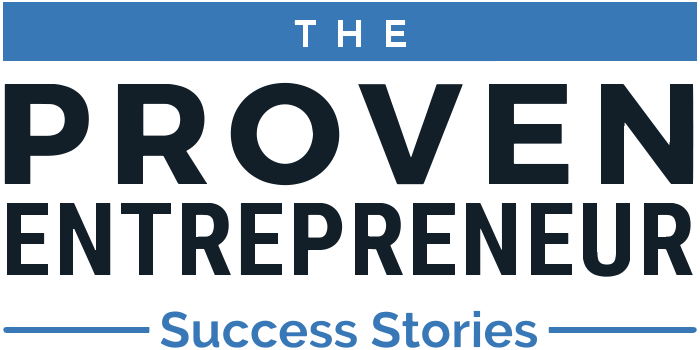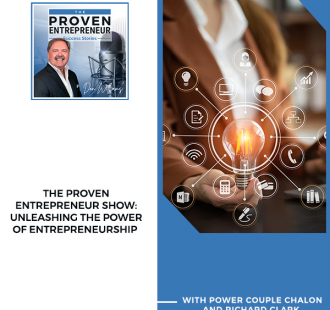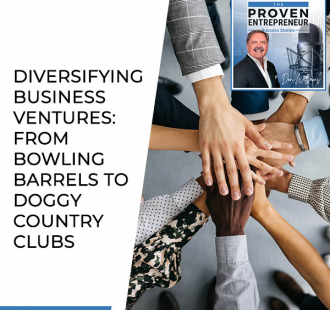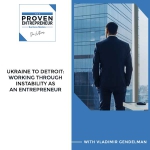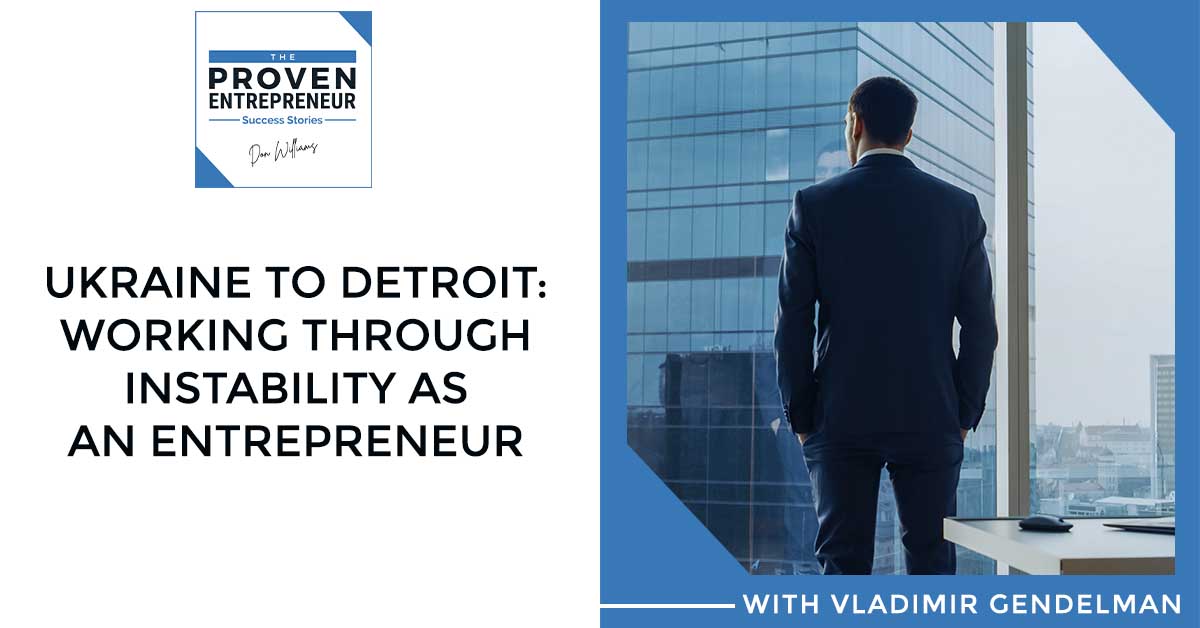
In the Soviet Union, there was little to no such thing as entrepreneurship. The government owns everything, and when they own everything, competition doesn’t exist. This is where Ukrainian Entrepreneur Vladimir Gendelman grew up. His parents always taught him not to pursue entrepreneurship. This did not hold him back, though. He moved to America to start his entrepreneurial career and became the Founder and CEO of Company Folders. Learn how he started his award-winning business as a basement operation and how he grew it into a multi-million-dollar company. Join Don Williams as he talks to Vlad about his start in the folder industry. Learn about the time he gamed the system and how that backfired. Discover more about the Ukrainian tech market. And find out his thoughts on the Russia-Ukraine war and why you still need to support Ukraine.
For information on how to work with Don visit Work With Don Williams
You can also reach out to Don Williams at https://donwilliamsglobal.com
Please join Don and his businesses in support of St. Jude’s Children Research Hospital in its Mission to cure Childhood Cancers. You can donate to St. Jude at stjude.org/donate
—
Watch the episode here
Listen to the podcast here
Ukraine To Detroit: Working Through Instability As An Entrepreneur With Vladimir Gendelman
I have a treat with our guest, my very good friend from Detroit, Michigan but originally from Ukraine, Vladimir Gendelman. Vladimir, welcome to the show.
Thank you. I’m excited to be on your show. Thank you for having me on.
It’s my pleasure. Vladimir and I met years ago in Entrepreneurs’ Organization. Our paths have crossed multiple times in our paths through EO. Vladimir and his lovely wife, Janet, are authors with me in the fourth book, the Gratitude book. We’re very close friends. I’m thrilled to have Vladimir on the show. Let’s start here. Tell us about your primary company. What do you do for a living? You’re an entrepreneur. What does that look like?
The company I own is called Company Folders. I started that company in 2003. We are a printing company specializing in presentation folders, binders, and envelopes. The way the story went is I originally I came from the Soviet Union. In the Soviet Union, the structure is Communism, supposedly. The government owns everything. When the government owns things, there is no competition. Therefore, everybody pretty much had the same silverware, wallpaper, furniture, and clothing.
You go to the store and you can choose 1 of 2 cheeses, bolognas, or whatever else. There was a little bit of choice, but maybe 2 or 3, not the variety we have here, and because of that, you can’t stand out. No matter what you go with, you will have something that everybody else has. The whole idea is standing out the quality of expressing yourself via decorations, the fashion you wear, the way you set up your apartment, and the furniture and the art you have. Everything else is pretty much impossible.
I came to America in 1990. The options are through the roof. You go to the store and you have dozens upon dozens of cheeses. You have sausages in dozens and all sorts of clothing. There is clothing that you can buy for $5 and $500. In the beginning, I thought the clothing that was $500 was made up and nobody ever bought it, but then I learned that people did. There are cars and everything. There’s an abundance of options in everything. It was great because you could express yourself.
I started my entrepreneurial journey and started the company called Orange Computer Solutions, where I would do computer repair and networks for people. I always looked at my function as to take care of my customer any which way. One of my clients, for whatever reason, says, “You’re a computer guy. Can you help me do a nice company folder?” I said, “How hard could that be?” We’re talking about the year 2003. The internet is in full swing. Go online and type a few words, and you got it.
I went ahead and did that. It turns out there are no great options here in America for presentation folders. I started looking further, driving around locally, and finding better places. There is nothing. I’m like, “There is a market in this country where there are no options.” I figured they had to fix it. I’m like, “Who’s they?” The next question was, “Why not meet?”
That’s how the company started. We specialize in presentation folders. Over the years, we added binders and envelopes. The whole idea is that we offer the largest selection of die cuts, papers, coatings, finishes, and so on. We did a fun experiment. We took all the different variations and options that we offered and multiplied them. It turns out that we could have over a hundred million different product variations for all the options that we offer.
Vladimir, I’m going to take you all the way back to little Vladimir at five years old. At the time, you were living in what country?
When the government owns everything, there is no competition. The ability to express yourself disappears. Click To TweetThe Soviet Union in the Republic of Ukraine. Back then, Ukraine and Russia were not countries. It was the Soviet Union that consisted of fifteen republics, including Ukraine and Russia.
In your household, did an adult set an entrepreneurial example for you as a young boy?
The message I got from my parents, especially my mother, was, “We do not have entrepreneurs in our family. We are not entrepreneurial. Once or twice we ever tried to be entrepreneurial, we lost money. You should never try it again.” Both of my parents are doctors. My grandparents are doctors, lawyers, and professors. The word entrepreneur and the whole notion of doing something of your own were as strange as going to the moon.
A large piece of that is because of the sociopolitical and economic environment of what was the Soviet Republic.
Partially maybe, but as you know, deep inside, you’re either an entrepreneur or you’re not. In some way, I was born with that entrepreneurship inside of me that the rest of the family never had. That manifested itself when I was a kid.
It’s so funny to me. Many people think, “Entrepreneurs got in it for the money.” I don’t want to say that there isn’t a profit motive, but after doing a hundred of these interviews and being an entrepreneur for years, it’s much more common that they have a problem with authority. They cannot stand for people to tell them what to do. They will be their boss in maybe a much harsher environment than it would be to work for someone in a more comfortable environment. After your childhood, you went to university and hitchhiked across America. What was the next step?
We left the Soviet Union on December 2nd, 1989. Due to the way the process worked, we had to go through Austria. We were there for a couple of months, spent five months or so in Italy, and came here to America on May 15th, 1990. We had no money. We had $423 or $427 for the three of us, my parents, and an abundance of options, things, and experiences. I wanted everything and I could afford nothing. Some of them will find the story.
I remember I went out the first time with some people I met here. We were in the country for maybe 1 week or 10 days. My father gave me $1. I didn’t know what to do with it. As we were walking around, the other kids I was with were also Russian immigrants from the Soviet Union and stuff. Therefore, nobody had money. We went to a grocery store called A&P.
I remember walking around. The only thing I was thinking was, “What can I buy for $1?” It didn’t matter what I wanted. It was all about the fact that I had $1. I came across a little bag of apple chips that were $0.59. Out of everything I found that was within my budget, apple chips, for whatever reason, stood out the most. I bought a pack of apple chips. I didn’t even think I wanted it. I just wanted to buy something. It was the experience of it. They were probably the best chips I’ve ever had.
When you unravel the psychology of shopping and consumerism, many times, it’s not about owning things. It’s about buying things. There’s a little dopamine hit that a person’s brain gets when they can make someone do something else. When you put your dollar on the counter and they give you the apple chips, you’re making them do something. There’s something to that.

You are an expert on Ukraine and doing business in Ukraine. Before we get there, I want to ask you two questions about Company Folders. One, will you share a hard lesson with us or something that happened in your career at Company Folders that when it happened, it hurt but looking backward, you can see where the positive was in that event? Do you have a hard lesson like that you can share with us?
Do you want the lesson where the ego got hurt or the pocket got hurt?
It’s whichever one hurt the most.
It’s probably the pocket because the ego is not nearly as important to me. When I started the company, I specifically started it as an online company. We’re talking about 2003, 2004, 2005, 2006, and 2007. It was the early days of the internet and Google. Google was the dominating force. Search engine optimization was the ultimate thing because you didn’t have to pay for anything. It happens for free. You have to optimize your website a certain way so that it ranks high on Google.
How do you do that? You do it by gaming Google. I did. I hired this company in Ukraine back in the day. They were masters of gaming Google. It was about two things mostly. Number one is having your keywords and the page as much as you can. Number two is to have links to your website and the proper pages with the proper keywords as a tab. We went to town on that. We had links coming from all sorts of websites, including gambling, gaming, porn, and all this other stuff.
It was great. It worked. We would rank in a lot of cases number one and number two across Google. That’s where all the business came from. It was one of those situations where you don’t think to yourself, “Google might get smart one day.” It did. On March 23 or 22 of 2012, we received a warning from Google. It was a natural link warning that said, “According to our algorithm, you’re unnaturally building links. We can’t count them or we have to count them against you. However, that works.”
Long story short, we went from number 1 to number 5 and number 9 to the 2nd page, 3rd page, 5th page, and 10th page. We’re not even in Google anymore. It happened quickly. We lost 76% of traffic in a matter of days. This was a new thing. Google got smarter. There is no direction or instruction. Nobody knows what to do. Google is not saying anything. They don’t have to. It’s their house.
Other people don’t have experiences either and nobody to talk to. Meanwhile, all I’m seeing is that my expenses are still there. The revenue goes down to almost nothing. It took us over a year to get out of that mess, which means we had to contact all the people and all these websites that had bad links pointed to us. We can’t use a Ukrainian company for that. We have to do it internally. I’m so grateful. They have a phenomenal team.
We all came together and started working on it. We had to contact everybody multiple times to ask them to remove the links and so on. It took over a year. We were able to get rid of all of that. We ended up with a clean slate. We’re still not ranking. We’re just getting through the clean slate. It’s getting back to zero. We started building a new marketing strategy. The financial hit was excruciating. I was on the verge of going bankrupt. We’re talking about March 2012.
In August or September 2012, I met Bob Shanafelt, who briefly mentions EO. I’m like, “That sounds cool.” I meet with Taylor. At the moment, she is our Membership Chair. We talked. She tells me how much the dues were. I’m like, “That’s a lot of money. I can’t afford it,” but I’m thinking to myself, “If I’m going to go bankrupt, I might as well do it with style.” At that point, the due amount doesn’t matter.
Gaming systems can work well. However, you can never count on it because you never know when it's going to stop. Click To TweetThat’s how I joined EO. Between my amazing team and everything I learned in EO, I ended up with a way better company than what we had before. Our marketing strategy is as solid as it could be. It is all based on being an expert and a thought leader in the field for the company. We have a phenomenal social following to the point where on numerous occasions, I received text messages from some of my friends whose kids take a graphic design class in high school.
The teacher brings up tutorials from my website, and because their kids know me, they would take a picture and send it to their parents. The parents would send it to me. How cool is that? The one lesson I learned was that gaming systems, companies, and everything works well. However, you can never count on it because you never know when it’s going to stop. When it stops, it creates way more problems than anything else out there.
I regularly have people who ask me to teach them the tricks of the trade. My reply is always this, “Why don’t we learn the trade because the trade will last and the tricks will end? I can’t tell you when but they will.” Thank you for sharing that. I’m going to ask you one more about your business. I want to dive into your expertise because you were born in Ukraine and you still have business operations in Ukraine. It’s at war with Russia. That presents certain challenges to operating a business along with everything else. Share with us a golden nugget or something that you’ve learned in your time as an entrepreneur that you will be like, “This is pure gold.”
By nature, I’m the kind of person who likes to make others feel good about themselves. I value that. To me, that’s important. Being an entrepreneur puts me in a position where I can help a tremendous amount of people. Some of them are my employees and some are the people I come in contact with who maybe need our services and something that we have the expertise in but cannot pay for it.
To me, it’s all the same. I want to help people because I believe that if you help enough people for money or not, you will always end up with enough money for whatever you need. I’m not looking to maximize every interaction. I’m looking to maximize my value and every interaction. To me, that’s truly a golden nugget.
If you concentrate on delivering value, you won’t have to worry about the financial side. Money will come. It’s the value first. Remember, it’s all about the customer all of the time. Everybody hears that and most people agree, but then they go out and don’t act like that. It truly is all about the customer all of the time. Let’s hop into your expertise with business operations in Ukraine. Start and give us a couple of minutes on not the Ukrainian version of history between Ukraine and Russia or the Russian version but Vlad’s version of history between the two to set the stage for what we will get into in the current operations.
I don’t know if there is history per se. This is not the Middle East, where they constantly fight for a piece of land. Ukrainians and Russians, at the end of the day, are the same people. The language and the food are slightly different. In the culture, maybe if you dig very deep, there will be a slight difference there, but in reality, if you put Russians and Ukrainians next to each other, they look the same. You will never tell them apart.
What is going on there is not between Russia and Ukraine. It is not between the Russians and Ukrainians either. This is between Putin, who has been in power for over twenty years and they think it got into him. It’s the fact that he’s an ex-KGB guy from the Soviet Union and the fact that he wants the Soviet Union. He wants the ultimate power and ultimate tyranny. That is it. There is a lot of propaganda going on in Russia.
I believe that only because of that, there are plenty of rations there that support this war and what Putin is doing, but I don’t think they truly understand what’s going on to the point that due to the propaganda and the way they show the news, people there don’t see the war and that people are dying. They see the country where Russia comes in and liberates Russians who live on Ukrainian territory. For that reason, it’s strictly Putin. I don’t think that there is a history that we can point to and say, “Back then,” because it has nothing to do with that.
Since you started Company Folders, have you always had staff in Ukraine?
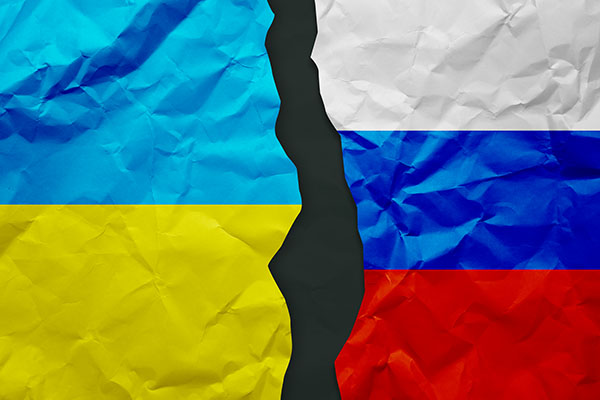
Yeah. Interestingly, when I needed my first website, there were no social media back then. We’re talking about 2002 and 2003. There were discussion boards and forums online. I took part in those. Through some of those forums or discussion boards, I met this guy who lived in Kharkiv, Ukraine, which is the city that I came from. He was a web designer. I remember thinking to myself, “How cool is that if I can get that guy to create a website?” I came from there. If I can give back in whatever way, that’s awesome. I hired that guy and he created the website.
Prior to all of that, I was a web developer myself. After he created the website, I was able to go back in and start doing the tweaks and everything I needed to do on a smaller scale with improvements on a daily basis. That’s it. I hired him for a project and we were done. When the next time around, they needed to improve the website, I found another guy who was a web designer who created the next version of my website, which was also project-based. He did the website and we were done.
After that, when I needed to do some major web work again, I figured, “At this point, it’s better to hire somebody full-time.” That’s how I hired my first web developer who’s still with me. His name is Denis. Soon after, he brought his friend, Eugene. Both of them are still with me. We’re talking about one of them being with me for 13 years and another one being with me for 14 in 2022. They also brought this other guy, Anatoliy, who’s our designer. He’s still with us also for 11 or 12 years in 2022. Over time, we hired a few more people.
You had operations in Ukraine for many years. Tell us. How do you manage when things have been fairly stable for those twenty years?
It’s not necessarily.
How do you manage operations during periods of instability?
Things were great for a while. It was wonderful. Denis, Eugene, and Anatoliy, all three of them and a few more guys, were in Donetsk. In 2014, Russia came in and bombed the Donetsk area. Their houses got destroyed. Back then, I helped them move to Kharkiv. They moved to Kharkiv and started their lives again from scratch. That also means that they own their apartments. Think of it as a condo in Donetsk. They had to leave it behind because it’s now worthless, move to Kharkiv, and start all over again.
Finally, they’re making their lives. They feel comfortable and love the city. Eugene even bought a second condo. He did not even have time to remodel it and the war started again. Once again, their building gets hit. His apartment is gone. The way I see this is there are different measurements that you can apply to things. At the end of the day, it’s what’s important to you and what your intent is.
My intent is very simple. I have phenomenal employees and a team who makes Company Folders successful. The way I see it is that my job is to support everybody who works for me in a way that they need the support every time. Every time we have an unstable situation like the one in 2014 or now, we work with it. We don’t apply policies because when you talk about policies, you talk about the limitations of things. We look at it as they all have different needs and whatever you need at the time.
If you can’t work, don’t work. I’m still going to pay you. I showed them on day one that they would not miss their pay. They will still have their job no matter how long that takes and no matter what it takes, whether they could or couldn’t work. We will figure out ways around the company in some other capacity. We did. Some of them still don’t work. Is it helpful to the business? It’s detrimental, but I am here. I am in my safe home. I have food to eat. We have windows and heat. They do not. Their needs are more important than mine.
If you help enough people, whether there's money or not, you will always end up with enough money for whatever you need. Click To TweetI think back to a story. There was a bank based in New Orleans, Louisiana, Hibernia Bank. It’s a regional bank. They had a contingency plan for the bank if a hurricane hit the call center employees of the bank. Most of the banking doesn’t take place in the drive-through or the lobby. It happens over the phone or online. They would be able to go to Shreveport, which is a couple of hundred miles away and far enough out of the storm path that they would keep the bank operational.
What they found when Katrina hit was the bank was under 16 feet of water. It filled the basement and the first floor. It did not fill the second floor but was on the second floor. They told everybody to go home. What happened, in reality, is they told them to go to the secondary location in Shreveport. In reality, what happened is the people didn’t go to Shreveport because the primary concern of the people was their homes, families, and belongings. They took care of that.
We talked about being all about the customer all of the time. As a leader in a business, your primary customer is probably your team. Their primary customer is the customer. Herb Kelleher with Southwest Airlines was the first guy to say, “The customer is not always right.” What you’ve always heard is, “The customer is always right.” We know that’s not true.
The customer isn’t always right, but Herb followed that up with, “The customer is still the customer. They’re still paying the bill. We have to treat them accordingly, but I will take care of my employees, and because I take such great care of my employees, they will take care of my customers.” That has worked unbelievably well for Southwest Airlines. It will work for anybody else. How do you communicate with employees in a conflict zone?
Surprisingly, it is very easy. Their internet still works well. We talk via WhatsApp, Slack, Facebook Messenger, and Skype. We have multiple channels of communication in case one goes out, but so far, everything works. We have not had any problems with that. Luckily, Elon Musk came in and gave Ukraine internet through Starlink. How awesome is that? You’re talking about the golden nugget of being an entrepreneur. That right there is as golden as it gets. The government is trying to do things. Here is one guy.
It’s interesting to see how there are a lot of one-guys with maybe not as big of a name as Elon Musk and a lot of people out there solving problems when our government leaders can’t seem to get a handle on what to do. Other than Ukraine and Russia, there are a lot of talks. That doesn’t help anything. How are you managing the short-term but planning for the ultimate recovery in the long-term?
A little bit of redundancy comes in all of our people here internally who work with customers like customer service people and salespeople are all trained as graphic designers. The job of Ukrainian designers used to do all the customer jobs. While they cannot do that, people here could, and because of that, we don’t have to fool the staff. We can operate. When it comes to development work, that is all future growth. I am taking the opportunity quest on that because we are not developing future staff. Once again, what is their future, even financially, however you want to measure it against potentially people’s lives, comfort, and well-being?
What insight can you share on the tech sector in Ukraine?
I published an article maybe in 2015 in either Money or Time magazine talking about how awesome the Ukrainian tech market is. The people are smart and hardworking. A lot of them speak English. Compared to where we were in 2015, it has escalated by now. They got way better and smarter. There are amazing experts and professionals out there. As far as I know, outside of Silicon Valley and Israel, that’s probably where your best tech people are.
There is an economic advantage as a Ukrainian developer as opposed to a US developer.

They make less money there than they do here. However, the economical difference gets smaller every day. Sometimes, a developer in Ukraine would cost you $500, $600, or $800 a month. Now, if you’re looking at a good developer, you’re easily looking at $4,000, $5,000, $6,000, $10,000, or more. There are architects there that make over $200,000.
As we look at the global economy and global outsourcing, here’s what happens. We’re in the contact center business. Years ago, that got pretty hot in India. At the time, labor was maybe $1 an hour as opposed to $10 or $12 here, but as those markets mature, wages and costs rise and experience the same things we would experience here to where there can be a bidding war type of scenario for people with true talent in the US. You see that all over the world in various industries as those markets mature. That’s the way that goes.
I’ll quickly follow up with this. I have some friends from back in the day in Ukraine that are doctors. As doctors, they make $400 to $500 per month. You take developers who make thousands of dollars per month. That puts them above pretty much anybody in the local market because the average salary is still a couple of hundred bucks a month, either way you look at it, not for tech people. Designers and developers make much more.
Is there any question I should have asked you that I haven’t? We’re in the fourth turn. I can see the finish line coming up. Is there any last question or anything you would like to share with us?
The one thing I would like to share is this. The war has nothing to do with Russia and Ukraine. In my opinion, it’s for Putin. Nevertheless, the Ukrainian people are suffering. Cities get leveled, people get misplaced, and buildings get knocked down. For everybody who’s reading, please do your part in supporting Ukraine. There are plenty of organizations out there that collect donations that they use to buy supplies. We’re talking about humanitarian help. We’re not talking about the army, forces, and politics. We’re strictly talking about taking care of people.
There are pregnant women in half-broken buildings with no windows in the middle of the winter with no hospital to go to because it has been knocked down. There are no doctors because doctors either left or died. They’re scared. People are packed in metro stations and subways, sheltering from bombs. Please find it in your heart to help Ukraine. Donate to any of their organizations. If you can’t figure out which ones, my email address is Vladimir@CompanyFolders.com. Email me and I’ll guide you. That’s the biggest message.
That is a great note to finish on. Please support Ukraine and the people in Ukraine that need basic life supplies during this time. Vladimir, thank you so much for coming to the show.
Thank you for having me, Don. This was great.
That’s the episode of the show. I’ll see you next time.
Important Links
About Vladimir Gendelman
 An experienced authority on entrepreneurship, small business, and business marketing, Vladimir Gendelman, is the founder and CEO of Company Folders, Inc., which specializes in printing custom presentation folders. He is a regular commentator and guest contributor on business podcasts and news outlets. As a young entrepreneur, he started his award-winning business as a basement operation and grew it to a multi-million-dollar company that services a roster of clients that includes Bed, Bath & Beyond, Hallmark, Verizon, and MGM.
An experienced authority on entrepreneurship, small business, and business marketing, Vladimir Gendelman, is the founder and CEO of Company Folders, Inc., which specializes in printing custom presentation folders. He is a regular commentator and guest contributor on business podcasts and news outlets. As a young entrepreneur, he started his award-winning business as a basement operation and grew it to a multi-million-dollar company that services a roster of clients that includes Bed, Bath & Beyond, Hallmark, Verizon, and MGM.
For information on how to work with Don visit Work With Don Williams
You can also reach out to Don Williams at https://donwilliamsglobal.com
Please join Don and his businesses in support of St. Jude’s Children Research Hospital in its Mission to cure Childhood Cancers. You can donate to St. Jude at stjude.org/donate
